|
Normally when I see the title, "World
News," I automatically assume it refers to "other than in the United States;" however,
since it appeared in a 1960 issue of Aero Modeller magazine, I need to keep
in mind that it likely means "other than in the UK." In fact, it does. Do you ever wonder
where all the thousands of incredible model airplanes that have showed up in the modeling
magazines over the decades are today? Some, of course, have crashed and were trashed,
as no doubt were the ones that were damaged in non-flying accidents like getting stepped
on, having a chair or box thrown on it, or some impish child (or adult) decide it is
a toy. Worst of all are the models that have been deliberately tossed into the garbage
bin because relatives had no need for them once their builders / owners died. Isn't it
a shame to think that this Gee Bee racer and Avro 504K biplane are probably long gone
in the dust bin of history? One exception is that Spitfire XXII (not a model, though)
mounted in flying attitude outside Air Force Memorial House in Perth, Australia.
World News
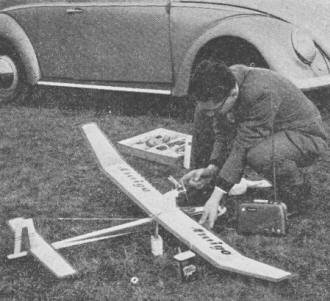
From Germany, an Amigo, the A/2 glider kit by Graupner, fitted with
a power pod. We predict a keen following for this model now we have seen plans. For three-channel
with elevators it has tail at rear of rudder and a novel elevator trim connected to rudder
movement. This is one prototype on test.
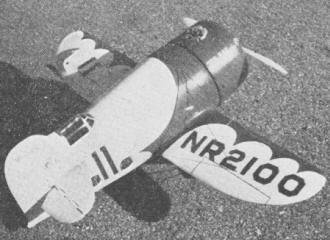
Gee Bee racer is to 1/16th scale for a Fox 15 by J. A. Wilson of Overland,
Missouri, U.S.A. Small, light frame is essential for high power to get good elevator
control on the "Flying Barrel", this 18 3/4-inch version flys at 70 m.p.h.
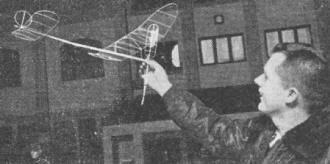
Also from the U.S.A. is Bud Wolfe's Class B microfilm Canard pusher,
a stable flyer which Bud, Vice-President of Chicago Aeronuts, is about to launch in their
Armoury hall. Canards bounce off girders - says Bud.
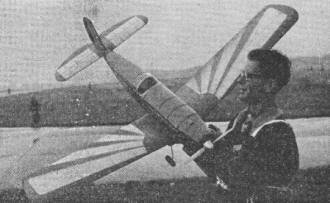
From Germany is a neat low-wing R/C by Bernhard Middeldorf of Osnabruck,
is single-channel for Webra 3.5 c.c. Bully, 58-inch span and Graupner Mikroton Rx
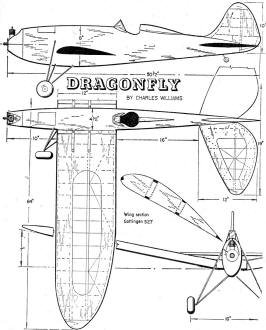
Charles Williams' Dragonfly is obviously not a new design; but with
a re-styled undercarriage and less dihedral it offers an elegance that is lacking in
current low wing efforts. Do you know when it first appeared? See foot of next column
for the date.
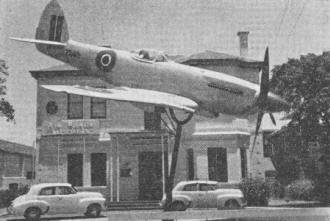
 Of modelling interest is the Spitfire XXII mounted
in flying attitude outside Air Force Memorial House in Perth, W. Australia. Enthusiasts
raised £1.000 to buy the airframe and have it shipped from England. Click the color photo
to see it today! Of modelling interest is the Spitfire XXII mounted
in flying attitude outside Air Force Memorial House in Perth, W. Australia. Enthusiasts
raised £1.000 to buy the airframe and have it shipped from England. Click the color photo
to see it today!
First evidence we have of model kits existing in the U.S.S.R. comes from Chaim Shniorson
of Tel-Aviv, Israel, who sent us the plan from a control-line trainer outfit for 1.5
to 2.5 c.c. It's a solid wing profile type, and Chaim tells us that though punched parts
are not of expected quality, the kit includes everything needed.
More details are coming through from Brazil, where, despite proximity to the source
of supply, balsa is a hard-to-obtain item, most work is out of kits, and modellers are
in some ways regarded as heroes. At S. Bernado, the centre of Brazil's automobile industry,
there is a 74-member club, while figures for Rio are said to be 300 modellers, with 500
in Sao Paulo and 200 in Belo Horizonte. We now have the completely detailed results of
the South American Championships held at Rio last October, the well-prepared 11-page
summary giving full information on all winning models as well as organisers and time-keepers.
From this it is evident that American and Japanese engines predominate, in particular,
Fox and Enya products. Team Racing follows the A.M.A. class for 5 c.c., but Speed is
limited to the F.A.I. 2.5 c.c. size, leading speed being 156 k.p.h.
Suggestion from Cec Tate in the "Airfoil" newsletter from Toronto Balsa Beavers in
Canada is a form of tank pressurising without resort to crankcase tapping. This is by
means of a loop of copper tube either passing across the exhaust port or around the hot
part of the cylinder, and connected to an otherwise blanked-off tank. Idea is that air
in the tube will expand and feed fuel to the carb under pressure. In the same newsletter
comes a new excuse for the combat boys: "It was running fine till the bellcrank made
a sudden trip to the wingtip! "
On March 27th, a week after the fantastic Nordic Champs reported on pages 296/7/8,
the third Finnish Championships took place over ice 28 inches thick at Hango. Conditions
were perfect, with no wind, and temperature enough that competitors were in shirt-sleeves
over the snow-covered lake. In consequence, model performances were even higher than
ever and in the A/2 class two competitors gained 900 secs. for the fly-off. Yet once
again, for the third time in succession, Pentti Ella had to be satisfied with second
place, being beaten on this occasion by a 14-year-old protege of the renowned Markku
Tahkapaa. The first eleven contestants had more than 870 secs. in this event, which gives
one a clear view of the expert standards.
In the Wakefield fly-off Pentti Aalto pipped Reino Hyvarinen, who had won the previous
meeting held three weeks before (and in which he knocked up the grand total of 2,637
seconds by flying in all three F.A.I. classes, including no less than 14 maxs - some
effort for one day of model flying!).
But the main feature of all these Finnish Championships is the F.A.I. power class.
In the second meeting on March 6th, there were four in the fly-off with Sandy Pimenoff
going to 331 secs. on a final unlimited flight to beat Osmo Niemi and Hyvarinen, while
at the third meeting there were no less than eight in the fly-off out of a 17 entry!
The time set for the fly-off was five minutes; but four managed that although two,
including Pimenoff, had fractional over-runs and eliminated themselves. That left Osmo
Niemi and Ilmaii Jokinen to decide, with the maximum increased to six minutes. Niemi's
"Pulteri" managed this all but four secs, to gain 356, against Jokinen's 331. There is
a strong Finnish view that 10 seconds engine run is the next move to prevent these continual
fly-offs, although who of the old-rule brigade would have foreseen current F.A.I. models
making such high times when the rules were first announced? Pulteri is, as already announced,
to be included in our Plans Service shortly.
As many T V viewers were able to see in Britain, the German eliminations to pick their
International team for the Radio Control Championships was held at Hirzenhain over Easter.
Karl-Heinz Stegmaier, who appeared on the T V screens, placed first with a high gross
total of 4,255 points in two flights, but was actually beaten by Gustav Samann in the
second round, although Gustav was not quite himself for the first flight. Most noteworthy
event was said to be Samann's advance since the International last year. Third place
went to Hans Gast and the competition was limited to two competitors for power and one
for glider per area. In the latter class, Hans Schumacher gained a big lead with 1,056
points against next man, Klaus Holighaus's 814.
It is with much regret, though we wish him all success in his new job, that we learn
of Bill Winter's departure from Model Airplane News as of Easter. Bill's Scrap Box and
M.A.N. at Work gossip features have become the European's insight into U.S.A. comment
on domestic and international modelling, and we know that all his regular readers will
miss his inimitable style. Bill has also been responsible for much of the radio control
development in the world, though he would be the last to lay such claims, through his
regular promotion of new ideas and wise editorial direction of radio matters, many of
the advanced designs for compound and multi-control coming from his own work-bench albeit
anonymously. We hope he will continue to be a modelling contributor between whiles when
not too involved in new duties with Flying magazine.
The Dragonfly was published in "Flying Aces" of March, 1938
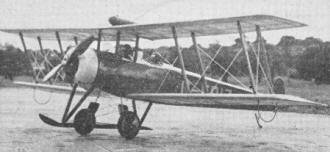
Picture came from Harold Jones whose Avro 504K from A.P.S. plans.
Model has a Mills .75.
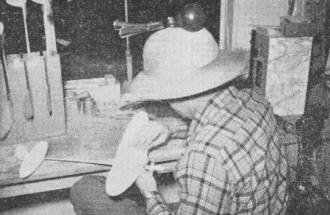
A Chicago Aeronuts novelty, the Boo-Boo hat, awarded each
month to the man who makes the biggest bloomer of the month. It's painted bright
pink in Day-Glow
Posted November 25, 2018
|